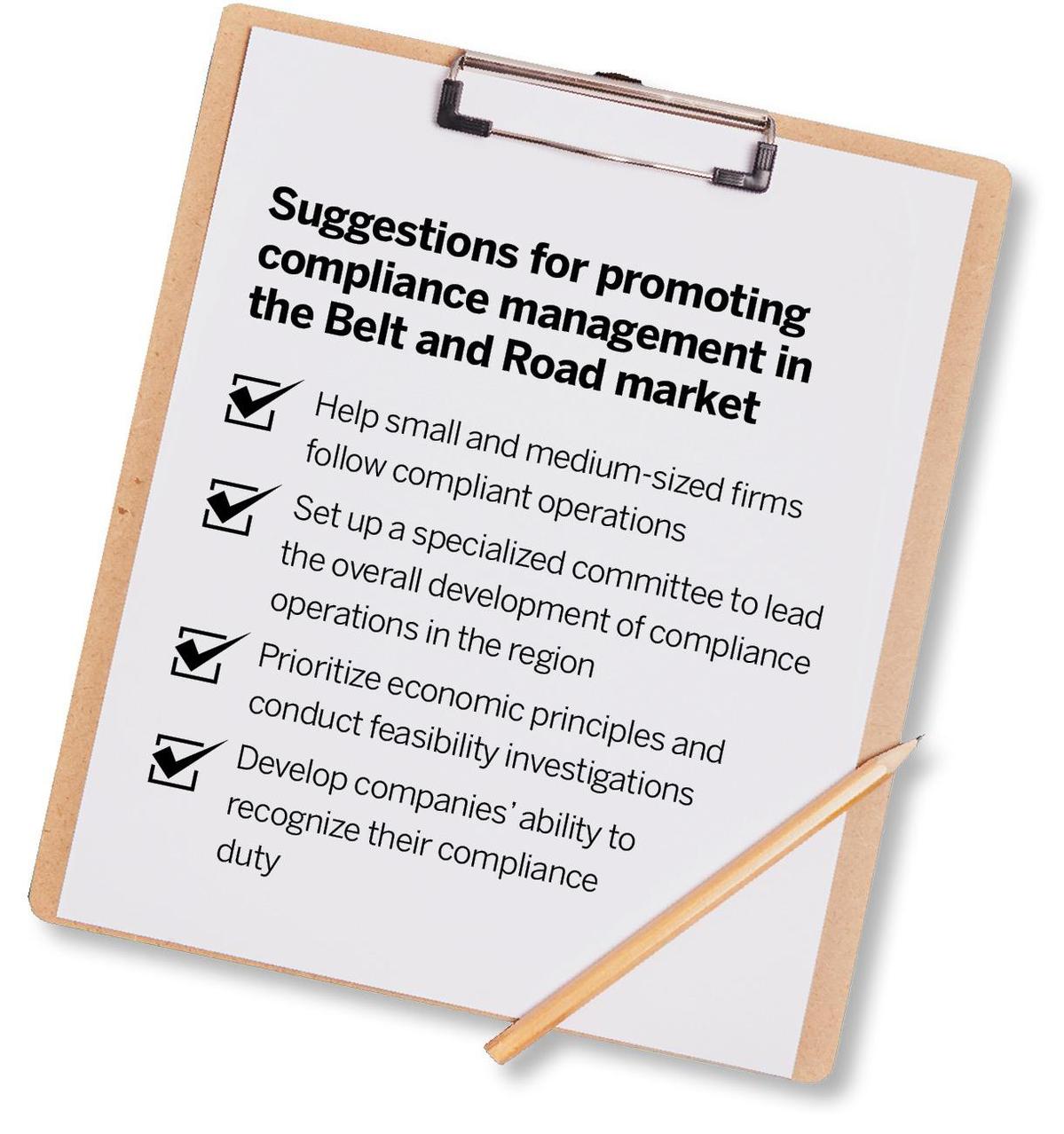BRI success calls for high compliance standards


High-speed development
The development of compliance has received global attention. In 1976, the Organization for Economic Co-operation and Development formulated the Guidelines for Multinational Enterprises - a balanced framework of nonbinding principles and standards for governments and enterprises. It covers issues such as human rights, the environment, employment and industrial relations, combating bribery, and addressing consumer interests and disclosure.
Nine principles of the United Nations Global Compact were launched in 2000 and, at the first Global Compact Leaders Summit in 2004, the addition of the 10th principle against graft by the United Nations Convention Against Corruption was adopted. More than 16,000 business and 3,800 nonbusiness participants have joined the UN Global Compact so far, according to its official website.
As the trend of strengthening compliance management took shape among multinational corporations, China formally joined the World Trade Organization in 2001 and began aligning itself with global rules.
Wang calls 2018 an epoch-making year for compliance in China as many important documents were enacted. In July 2018, the national standard GB/T 35770-2017 Guidelines for Compliance Management Systems, formulated by the China National Institute of Standardization, was formally approved and implemented. It's equivalent to the ISO 19600:2014, with guidance published by the International Organization for Standardization (ISO) in 2014 for establishing, developing, implementing, evaluating, maintaining and improving an effective and responsive compliance management system within an organization.
In the same year, the National Development and Reform Commission issued guidelines for Chinese companies' compliance operations abroad, while the State-owned Assets Supervision and Administration Commission of the State Council (SASAC) announced similar codes for State-owned enterprises.
According to Wang, more than 20 central government departments have initiated guidelines to promote enterprise compliance, or participated in the supervision of enterprise compliance so far. "This level of government involvement underscores the importance of compliance, and reflects the commitment to ensuring that enterprises operate in a responsible and compliant manner," he says.
Under such vigorous promotion, the development of compliance has been on the fast track. For instance, on the Chinese mainland, when the ISO updated its standards in 2021, it took just one year for China to adopt it domestically.
Bringing into action
In the next phase of the integration into global norms, Wang believes the Comprehensive and Progressive Agreement for Trans-Pacific Partnership will be the focus, as China formally applied to join the pact in 2021.
"China has now built a unique road to promote corporate compliance management with Chinese characteristics, and as a result, a large number of companies with strengthened compliance management, both State-owned and some well-known private firms across the country, have emerged," he says.
According to data from the SASAC in March, nearly 70 percent of the central SOEs have chief compliance officers to oversee and maintain compliance with their operations. More than 28,000 personnel are currently working on compliance management in central SOEs and their subsidiaries.
"China's culture of guanxi (personal and business relationships) had led to a lack of focus on compliance management in the past. Nonetheless, the government's vigorous efforts are yielding results as people's legal and compliance awareness has been on the rise," says Wang.
Shenzhen, in particular, has been a shining example of how compliance management can be integrated into a city's development. The bustling southern Chinese metropolis has made compliance management pivotal in its efforts to build a rule-of-law city. In line with the central government's call to support Shenzhen as a pilot demonstration zone for socialism with Chinese characteristics in the rule of law, the municipal government has been establishing a compliance management system.
A compliance management committee was initially set up in Shenzhen's Bao'an district to integrate and implement the central government's compliance management requirements into the local platform. The city also created an enterprise compliance construction and management information system. This system provides companies with a self-testing function for legal compliance, enabling them to manage the entire compliance process online intelligently.
Moreover, the People's Procuratorate of Shenzhen successfully conducted a corporate compliance non-prosecution reform exercise. A company that was put on record for smuggling of goods in 2020 was not prosecuted after showing strong commitment to and practicing compliance management. The People's Procuratorate of Shenzhen also conducted third-party supervision and evaluation of the firm's compliance construction results.
As a member of the third-party supervision and evaluation team, Wang found a relatively effective management system is now in place in terms of organizational and institutional systems, operational mechanisms and compliance culture.
Bao'an district's Procuratorate and the Justice Bureau have also set up a team of independent monitors for local enterprise compliance. The team has professional knowledge in various industries and compliance service experience, enabling them to provide "tailor-made" compliance plans for enterprises, helping them draw up rules and regulations, plug management loopholes, and cultivate internal compliance forces. At the same time, it has solved the problem of weak supervision of procuratorial organizations.
Wang stresses it's necessary to guide companies to transform their operations from passive compliance to proactive compliance, internalize external rules into internal regulations of the company based on legal operation, and elevate them to the level of corporate culture and values.
- Global influencers explore beer city at Qingdao WCNA
- Heavy rainstorm leaves three dead, four missing in Hebei resort
- Ethnic integration on the grassland
- China renews alerts for rainstorms, high temperature
- Beijing restores power, communications, water-supply to flood-hit villages
- Helicopter sightseeing project takes off over Wuliangsu Lake





































